
Join the Dorset research and improvement event – Wednesday 23 April

Latest research and knowledge exchange news at Bournemouth University


The next round for the UKRI Future Leader Fellows (FLF) is coming up – see this post. A previous FLF leader, Professor Matt Ryan is visiting Bournemouth University to speak about applying to the FLF scheme and how it has impacted his career.
Professor Matt Ryan, Professor of Governance and Public Policy from Southampton University, will be visiting on 28 January 2025, 2-3pm for an ‘in person’ talk on the Talbot campus. His talk will focus on applying for the Future Leader Fellowship. Matt is the perfect speaker, having been a Future Leaders Fellow since January 2020 through his Rebooting Democracy project. This aims to understand which innovations in public participation restore and sustain democracy. Matt has held visiting positions at the University of Canberra, as JQYA International Fellow at Geothe University- Frankfurt, and as a Turing Fellow at the Alan Turing Institute. He is founding co-director of the Centre for Democratic Futures and Policy Director at the Web Science Institute. His research crosses several disciplinary boundaries and focuses on democratic innovation, participation in politics and policymaking, as well as improving social research methods.
You are warmly invited to next week’s research process seminar. Hosted by FMC but open to all.
Becoming the Imposter: Reframing Imposter Syndrome as Systemic Dysfunction
There is an existential discomfort that forms part of ‘becoming’ a researcher. Undertaking a doctorate is an inherently transformative process in which we negotiate with contributions to knowledge, what counts as such, and whether we are capable of making them. Indeed, the process of becoming a researcher necessitates a coming to terms with our own sense of imposterism. As my presentation will discuss, there is an element of this imposterism that we can find solace in. We are all imposters, or at least feel as such. Developing on this theme my presentation will reflect on my own experiences as an interdisciplinary researcher, or self-defined bricoleur (Kincheloe, 2005) and nomad (Guattari and Deleuze, 1987). The original intention for my doctoral research was to ‘transform’ educational practices through developing technology. I drew on my computer science background and entered the domain of educational research and practice positivistic and naive. Ultimately, my thesis became a reflective, critical, autoethnographic unpacking of this naivety. Now, post-doctorate, as a practice-based educator-researcher moving between disciplines and research-contexts, I find myself in the same recursive state of (un)becoming. From this experience I will argue that the feeling of never quite becoming, of being an imposter, should be embraced and discussed openly for two reasons. First, to view these feelings of discomfort as diagnostic, revealing affective intricacies and pressures in the work we do (Breeze, 2018). Second, in the spirit of Bourdieu, to provide comfort through reminding ourselves that “a good number of the difficulties that we attribute to our own idiosyncratic awkwardness or incompetence are universally shared” (Bourdieu and Wacquant, 1992, p. 218).
About the speaker
Dr Phil Wilkinson is a Principal Academic in Communications at Bournemouth University, and a Researcher in Residence at the Digital Skills Hub, Boscombe. He is neurodivergent (ADHD), so his overall research profile is eclectic and interdisciplinary.
About the research process seminar series:
The purpose of this research seminar series is different to your typical research seminar and conference presentation. Instead of presenting the results and outcomes ofresearch, we want to share good practices around the process of doing research. This might often involve a focus on research methods but it also includes aspects of publishing, writing, time management, career management etc.
The idea here is that the speaker takes us through the anatomy of the project or approach focussing particularly on the process – the challenges, the successes, and the failures. For the audience, we walk away with a practical application of a method or approach we may not be familiar with or may not have applied in this way before. Our ambition is to make us all better researchers as a result.
21 January at 2pm
Please register here: https://bournemouth-ac-uk.zoom.us/meeting/register/tZwpcuihpjMqGdMBsgAIetwLxoSYn0GqMylD
And if you can’t make it but want the recording, then please register and I will send it to you.
cheers
Dan

Image made with Copilot
Foreword
The use of digital platforms by teenagers is a well-documented phenomenon, characterized by two key trends: a significant increase in usage and the associated dangers, which have been addressed by various governments and organizations (OECD 2020; BIK 2020). These studies have also included pre-teens (aged 9 to 12) in their samples, revealing that pre-teens use platforms significantly less than their older counterparts—about 50% less. However, these findings only capture a fraction of the actual online behaviour of tweens and teens, as evidenced by the COX survey, which shows that 95% of tweens go online daily.
The Impact of COVID-19 on Digital Platform Usage
The data mentioned above were collected before the COVID-19 pandemic. During the pandemic, children from a very young age were thrust into a crash course in IT to cope with distance learning. This rapid adaptation has significantly advanced their IT skills and ingrained the use of digital platforms for staying in touch with friends and family. This shift is irreversible, making it reasonable to assume that the use of platforms by pre-teens, even those younger than nine years old, will continue to rise.
Addressing Child Protection in the Digital Age
Child protection has been a focal point in several projects within the realm of criminal law, particularly concerning issues like cyberbullying, sexting, sextortion, and hate speech. However, this research aims to address a less-explored issue: the creation of content by the youngest users of digital platforms. Surveys, such as those by Pew (2018), indicate that the most popular applications among young users are YouTube, Instagram, and Snapchat. More recent studies have included apps like TikTok and messaging apps like WhatsApp, whose distinction from social media is increasingly blurred, and whose popularity is soaring (MessengerPeople 2020).
Copyright Concerns and Legal Accountability
All these apps enable users to create short videos or pictures to share within a private circle or the broader community of users. This content is protected by copyright, but who owns these rights? A review of the Terms of Use of these apps reveals that users must relinquish a significant amount of economic rights to the platform owner, who can share, modify, delete, etc., any content created by the user.
Even if these terms were legally enforceable (a point of contention due to potentially insufficient consent—Favale & Derclaye 2011), what happens when they are “signed” (i.e., downloaded) by a minor without legal capacity? Most platforms verify users’ ages by simply asking them to state their age, a method that is obviously ineffective.
Additionally, if the created content infringes copyright law, who is legally accountable? Copyright law is protected by both civil and criminal law across countries. The age for civil and criminal responsibility, for example in the EU, is not harmonized, with criminal responsibility ranging from 10 to 16 years old, while civil responsibility is usually linked to the age of majority. This raises questions about the numerous users who fall within or outside this age range.
Exploring Legal and Policy Gaps
My research work intends to explore the above issues. To this end, it reviews the most recent surveys, the legislation, and the policies of countries (initially, without specific geographical boundaries) regarding the protection of children online, and, most importantly, the legislation on “influencers” and “vloggers” (often defined as “content creators”).
I expect to find that this area of law is largely unexplored, likely due to the more pressing issues of child safety online. A substantial amount of policy/legislation is required to address these issues comprehensively.
This is a work-in-progress by nature, as most legislation is still at the proposal stage. Countries are beginning to address the issue of underage content creators (“influencers”) due to the staggering volume of their business. However, children with a large number of followers are not always “influencers.” This is just one of the legal distinctions that need to be made to guide forthcoming regulations on this matter.
In essence:
Pre-teens using social media are getting younger and younger (OFCOM: “a quarter of 3 to 7-year-olds own their own smartphone”). We cannot expect them to master copyright law, or any law, or even have a fully developed moral compass. Legislative action is imperative to protect these minors from the risks associated with modern technologies, as reliance on parental control (with parents mostly being Gen Z, native screen users themselves) is largely illusory.
Any input/ thoughts/comments are very welcome to mfavale@bournemouth.ac.uk
 During 2024 I had the opportunity to continue to work as international expert for three research funding organisations from across Europe and Central Asia, reviewing research proposals in the fields of events, tourism and hospitality:
During 2024 I had the opportunity to continue to work as international expert for three research funding organisations from across Europe and Central Asia, reviewing research proposals in the fields of events, tourism and hospitality:
✍️ Croatian Science Foundation (HRZZ)
✍️ Science Fund of the Republic of Serbia (SFRS)
✍️ Kazakhstan’s National Center of Science and Technology Evaluation (NCSTE)
While reviewing proposals is often time consuming, engaging as an external reviewer has been a very rewarding experience:
👉 It gives me insights into grant writing and review processes in contexts different from that of the UK. In particular, it teaches me that it is often important to consider the research context of those countries, and adapt expectations and assessment practices to it.
👉 Reviewing proposals from various institutions and countries keeps me aware of the latest developments and innovative methodologies in events, tourism and hospitality.
👉 Through my detailed feedback, I can contribute to help researchers in these countries improve the quality of their research projects and their grant writing skills.
👉 By influencing which projects receive funding, I also play a small part in directing research efforts toward areas of significant societal need and impact.
Dr. Miguel Moital
Principal Academic in Events Management
Dapartment of Sport & Events Management
BUBS



This collaboration, funded by the National Institute of Health Research (NIHR), is led by University of the West of England (UWE) Bristol, and co-hosted by Bournemouth University (BU), with support from collaborators across the region.
UWE Website: Health and Care Research – MRes – UWE Bristol: Courses
BU Website: NIHR INSIGHT South West Central Programme | Bournemouth University
Find out about how one Current BU MRes student is using this programme to develop her clinical research career.
Key Opportunities:
Further details on the programme website: NIHR Insight Programme for South West Central (insight-southwestcentral.net)
Please also find a shortened link to the website: https://tinyurl.com/yaus96fs
If you have any questions or need further information, feel free to contact the programme team at insight.swcentral@uwe.ac.uk.
The decision has been made to not renew our subscription to the PLOS flat fee publishing deal in 2025. This means that authors of outputs accepted for publication in a PLOS journal after the previous agreement end date of 31st December 2024 will be required to pay an open access article processing charge (APC).
Any authors who have already submitted an article to a PLOS journal which is still under consideration should contact openaccess@bournemouth.ac.uk immediately.
Authors who were considering publishing in a PLOS journal, but have not yet submitted their manuscript, should explore the seven other transformative agreements which BU is signed up to, which enable BU authors to publish open access for free or at a discounted rate. Authors that still wish to publish with a PLOS journal must apply to the open access publication fund before submission of their manuscript.
For all related enquiries, please email openaccess@bournemouth.ac.uk
There is one week left to apply to run an event at the British Science Festival 2025!

The British Science Festival will take place in Liverpool from the 10 – 14 September 2025, and will be hosted in partnership by the University of Liverpool and Liverpool John Moores University.
The programme showcases cutting-edge science, technology and ideas that challenge, inspire and excite audiences. Each year, thousands of people come together to celebrate the latest developments in research and engage in open discussion about issues affecting our culture and society. 
Open Call for proposals – Do you have an idea to engage public audiences with science and research?
Anyone can propose an event and the Festival celebrates science in its broadest sense. The organisers are looking for proposals from individuals, researchers, industry professionals, artists, writers, organisations, charities, academic institutions, and more. They aim to programme a range of formats from talks to drop-in activities and creative content that challenges perceptions of what science is and can be.
The Festival is free and open to all, but content should be appropriate for an adult (16+ audience).
More information, including how to submit a proposal, can be found here
The deadline for proposals is 23.59 20 January 2025.
If you have any questions, or if you would like to discuss your proposal, please email festival@britishscienceassociation.org.
Alternatively, should you wish to discuss your application with BU’s Public Engagement with Research team, please contact publicengagement@bournemouth.ac.uk.
The Doctoral College is delighted to offer a second round of funding for the PGR Research Culture and Community Grant (RCCG). This grant is intended to support PGR-led activity across researcher development, research culture and research community building initiatives.
This grant can be used to fund a social event, training activity, analysis workshop, digital skills session, writing session or other activity to enhance the PGR journey experience. In addition to community building, the purpose of the grant is to enable PGRs to gain transferable skills and experience in planning, organising, promoting and implementing such activities.
Several events supported by the first round of funding took place in December 2024, including ‘Building Your Research Toward High-Quality Manuscripts’ forum, organised by Shadeepa Karunarathne and Aashish John from the Faculty of Science and Technology.
We are pleased to share Shadeepa’s experience and thoughts following on from the successful running of his RCCG funded event:
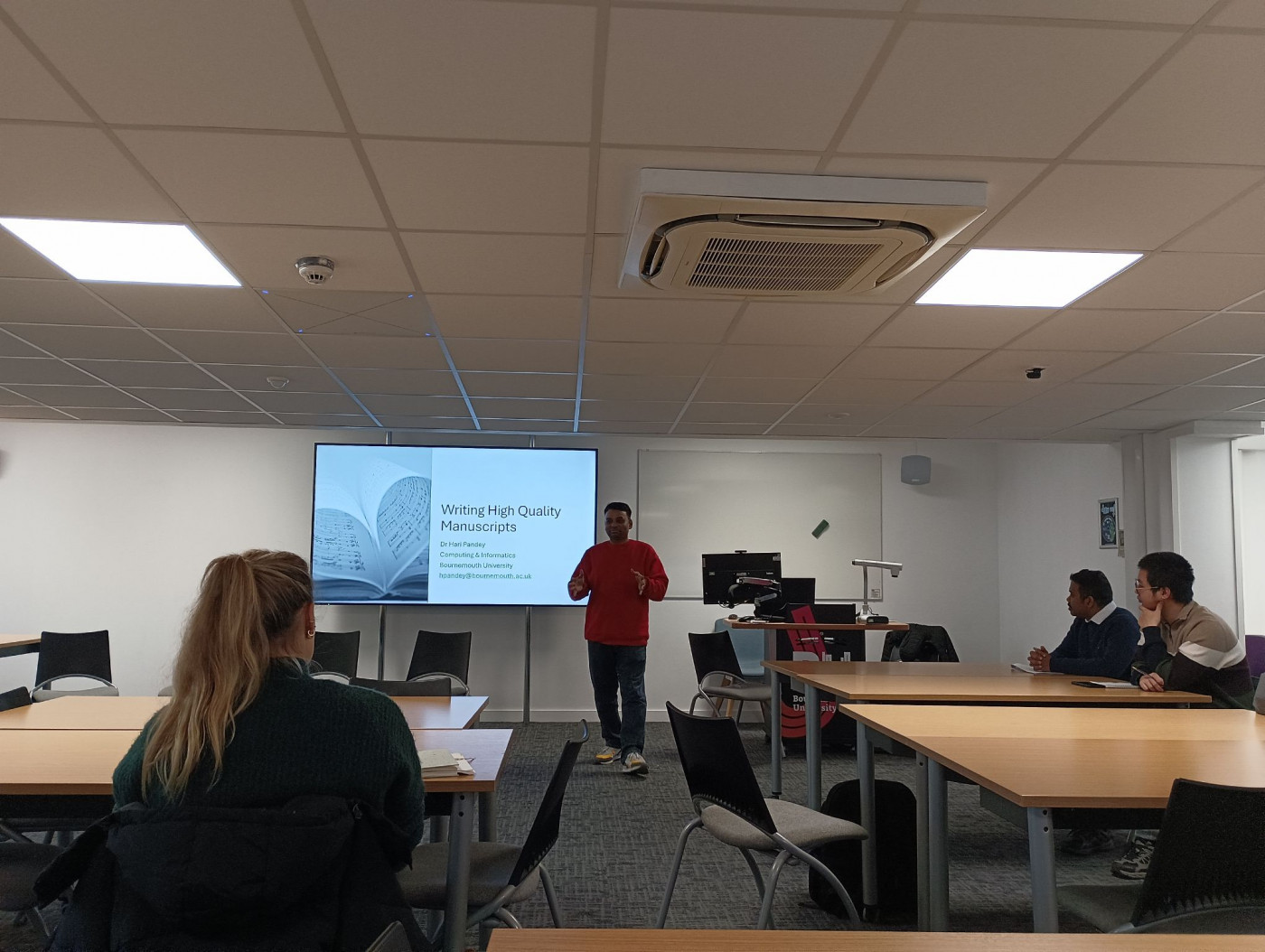
As I near the final stages of my PhD journey at Bournemouth University, I felt inspired to give back to the community that has supported me over the years. Recognizing the challenges many postgraduate researchers (PGRs) face in producing high-quality manuscripts, I initiated a forum titled “Building Your Research Toward High-Quality Manuscripts – Guidance from the Highest Ranked BU Scientists.” This event aimed to bridge the gaps in collaboration and offer practical guidance to help PGRs elevate their research output.
The forum brought together some of BU’s top-performing academics to share insights on critical aspects of academic publishing, including structuring manuscripts, conducting effective literature reviews, addressing facility limitations, and navigating the peer-review process. I am immensely grateful to Prof. Edwin van Teijlingen, Dr Hari Pandey, Prof. Jian Zhang, and Prof. Matthew Bennett, who generously shared their expertise as resource people, making the sessions incredibly insightful and impactful. Their guidance offered participants actionable strategies to refine their research and produce manuscripts worthy of high-ranking journals.
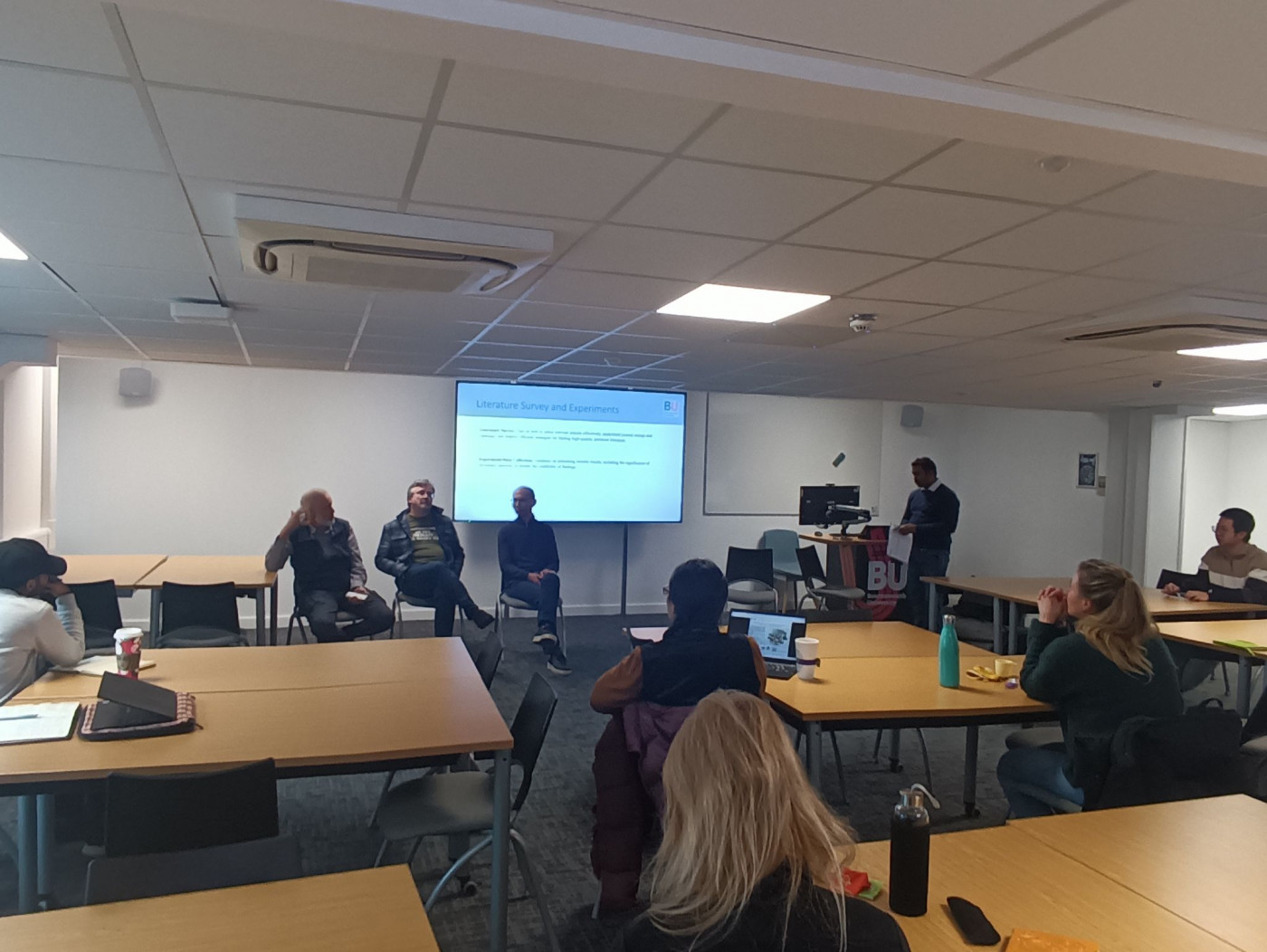
Organizing this forum was a first for me, and I couldn’t have done it without the incredible support of Aashish John, my co-organizer, whose collaboration was instrumental. My sincere thanks also go to Enrica Conrotto and the Doctoral College for their guidance on planning and execution, as well as the PGR Community and Culture Grant for funding the initiative.
The response to the event was overwhelmingly positive, with a full house of 40 participants and glowing feedback highlighting its relevance and practicality. Many attendees emphasized how beneficial it was and expressed a desire for more such sessions in the future.
Shadeepa Karunarathne (FST)

If you would like to apply for the new round of funding, full details can be found on the Doctoral College Brightspace, including the application form.
If you would like to discuss your ideas before submitting your application please contact:
pgrskillsdevelopment@bournemouth.ac.uk
The Doctoral College
 We are excited to introduce a new approach to enhance the quality of grant applications, inspired by the success of our BA Small Grants internal peer review process. Over the past two years, this process has delivered excellent results, and we aim to adapt it for specific UKRI calls that are relevant to this approach, such as the AHRC Catalyst and Curiosity (in later rounds) awards.
We are excited to introduce a new approach to enhance the quality of grant applications, inspired by the success of our BA Small Grants internal peer review process. Over the past two years, this process has delivered excellent results, and we aim to adapt it for specific UKRI calls that are relevant to this approach, such as the AHRC Catalyst and Curiosity (in later rounds) awards.
Going forward, we will adopt a cohort-based approach that leverages the repetitive nature of these calls (four times a year up to cohort 6), and potential other similar calls.
Key elements include:
Pilot
As the pilot, we have identified the end of round six of the AHRC Catalyst call and with the current update of opening of the calls to no deadlines, we have set the pilot internal deadline to the end of April.
You can also find all relevant information about the new scheme on the RKE Sharepoint site.
If you have any questions, please contact Eva Papadopoulou
Mandatory Training
Date: 30 January 2025, Thursday
Time: 10am to 11.30am
Microsoft Teams link to join the Mandatory Training – Join the meeting now
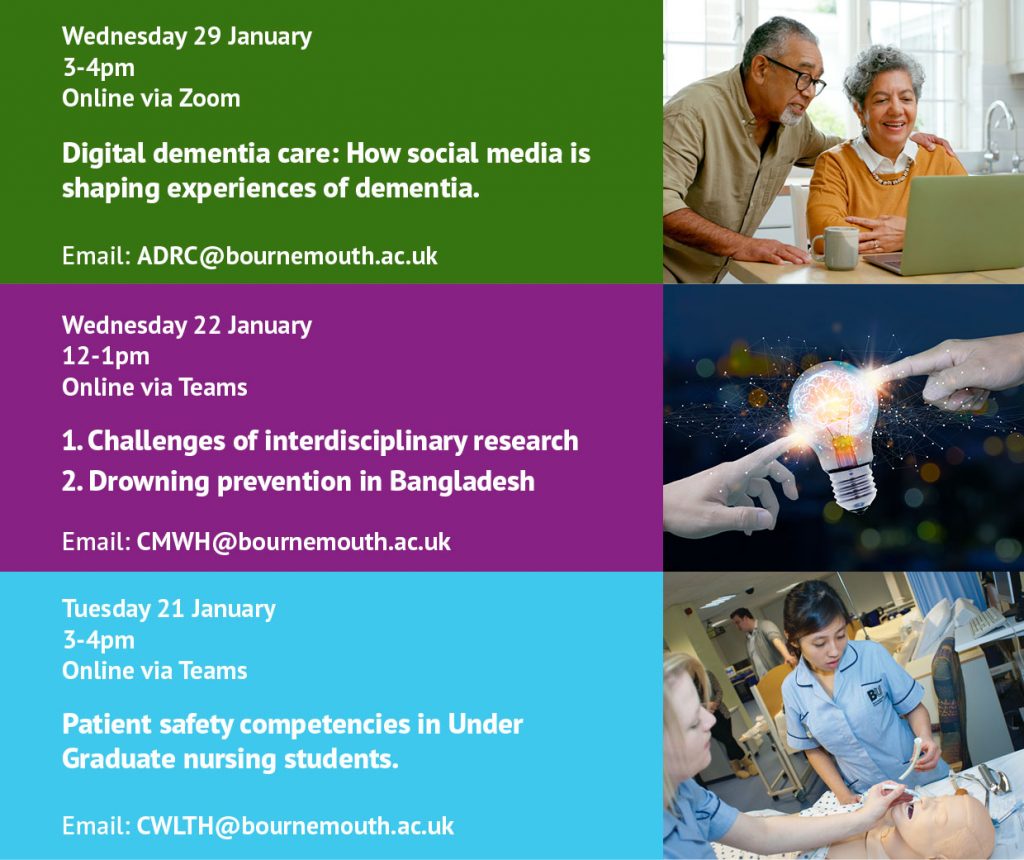
A European research project will explore how artificial intelligence (AI) could be used to support crime detection and prevention.
The PRESERVE project will look at ways to support law enforcement agencies in tackling crimes including sexual abuse, extremism, and drug trafficking through automating the collection and analysis of large amounts of data from across the internet.
This could include sources such as chat rooms, social media, and the dark web – identifying key communities and users involved in activities such as hate speech, human trafficking or terrorism, and using this information to better allocate police resources.
The €6 million project, funded by the European Commission’s Horizon Europe programme, involves partners from 8 countries across Europe – including researchers, law enforcement agencies from Greece, Spain, Romania and Czechia, and industrial partners with expertise in technology and software development.
As part of the project, researchers from Bournemouth University (BU) will develop the digital tools and AI algorithms to help monitor trends and detect crimes – particularly targeting the prevention and investigation of child sexual abuse, hate speech, extremist activities, and illegal drug trafficking.
The team will also look at ways to make the process fair, ethical and transparent to avoid potential bias.
Professor in Data Science and Intelligent Systems Hamid Bouchachia is leading the project at BU.
He said: “Through PRESERVE we are investigating ways to fight various types of crime that are instigated and amplified in cyberspace. Having the privilege of working with law enforcement authorities across Europe, including Europol, will support this exciting work in having real-world impact, resulting in ethical AI and machine learning-based technology that assists in combating cybercrimes towards the common good of the society.”
The project will run for three years and aims to embed the tools in an information management system to support European law enforcement authorities in collaborating more effectively and securely, without compromising the privacy of citizens.
New Cocreation and codestruction research just published
Drawing on value co-destruction literature, moral disengagement, social exchange and trait activation theories, this study investigates the role of dark triad traits, moral disengagement, and host incivility on peer-to-peer accommodation guests’ value co-destruction behavior. Data was collected from 428 Indian Airbnb customers and analyzed using partial least squares-structural equation modeling. Results show that among dark triad traits, only psychopathy directly influences value co-destruction behavior. However, all three dark traits lead to value co-destruction behavior through moral disengagement. Host incivility positively influences value co-destruction behavior and also moderates the relationship between psychopathy and value co-destruction behavior. The study offers a comprehensive understanding of the antecedents of guests’ value co-destruction behavior in peer-to-peer accommodation. The findings suggest that P2P accommodation managers need to instill moral accountability among guests and foster civil behaviors among hosts to prevent value co-destruction.
FoodBioSystems DTP are advertising 39 fully funded tax-free 4-year PhD studentships
Could this be the right opportunity for you?
We have projects on offer at our 7 partner universities.
We are looking for applicants who can apply their science to projects in research areas that span the entire food value chain including:
agricultural sciences, applied chemistry, artificial intelligence, biochemistry, bioinformatics, biological science, data science, environmental chemistry, food science & production, genomics, livestock farming and welfare, machine learning, marine sciences, mathematics, microbiology, nutrition, plant science and soil science.
All projects are advertised on the FoodBioSystems DTP website.
You can apply for up to TWO projects at any of our partner universities. Apply via our online application form https://foodbiosystemsdtp.grantplatform.com/ (opens 20 December).
Deadline for applications: Monday 3 February 2025 (10.00 GMT).
We offer a guaranteed interview scheme and an applicant mentoring scheme to students from eligible ethnic groups who hold UK fees status and who meet our academic eligibility criteria. Deadline for applicant mentoring scheme is 17 January 2025 (10.00 GMT).
Visit the DTP website to download applicant information, to find more information about the DTP training programme and profiles of our current research students.

A very happy New Year to all from the RKEDF team!
Book now for RKEDF training in January 2025
Click on the titles to find further details and book your place
Compelling Impact Narratives for Funding Success
Tuesday 28 January 10.00-12.00 – in person, Talbot campus
Struggling to effectively communicate the potential impact of your research in funding applications? Our training session, Impact and Funding Bids, will equip you with the practical tools and knowledge to develop effective plans of impact, articulate these in proposals and increase your success rates.
This session is intended for academics working on a proposal at the time of the session. It could be an early-stage idea, or a specific proposal for a funder. Please bring your proposal with you to the session to work on.
Future Leaders Fellowship – Meet Matt!
Tuesday 28 January 14:00 – 15:00 – in person, Talbot campus
Meet Professor Matt Ryan, Professor of Governance and Public Policy from Southampton University, who will be visiting for an ‘in person’ talk and networking session on the Talbot campus. His research crosses several disciplinary boundaries and focuses on democratic innovation, participation in politics and policymaking, as well as improving social research methods.
Epigeum Research Skills Toolkit
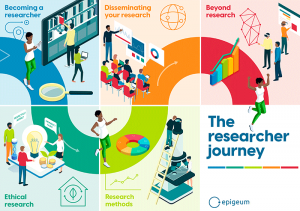 Do you want to refresh your researcher skills? Have a look at the Epigeum Research Skills Toolkit (on demand online modules). Further information on how to access Epigeum courses can be found here
Do you want to refresh your researcher skills? Have a look at the Epigeum Research Skills Toolkit (on demand online modules). Further information on how to access Epigeum courses can be found here
Please help us in avoiding any waste of resources; make sure you can attend or cancel your booking prior to the session. For any further information, please contact RKEDF@bournemouth.ac.uk
The BU PIER Partnership have joined forces with Community Action Network Dorset (CAN), The HealthBus Trust and the Lantern Trust to deliver a series of webinars and workshops to build capacity in the voluntary and community sector (VCS) to actively collaborate in shaping, designing and undertaking health, social care and community research. The series is funded by NHS England as part of the Dorset Research Engagement Network funding where PIER have been co-designing with community partners methods and approaches for collaborating with marginalised groups who are currently under-served by research, by drawing on the expertise of VCS partners who are embedded in these communities.
If you would like to attend or to share with your community partners, please see here
Webinars:
https://can100.org/event/introduction-to-research-and-the-role-of-the-voluntary-sector/
In person workshops:
Weymouth:
https://can100.org/event/building-research-capacity-workshop/
Bournemouth:
https://can100.org/event/building-research-capacity-workshop-2/
If you would like to hear more about earlier phases of this project where PIER have been co-designing how people who are homeless and vulnerably housed and VCS partners want to have a voice in research, see here.
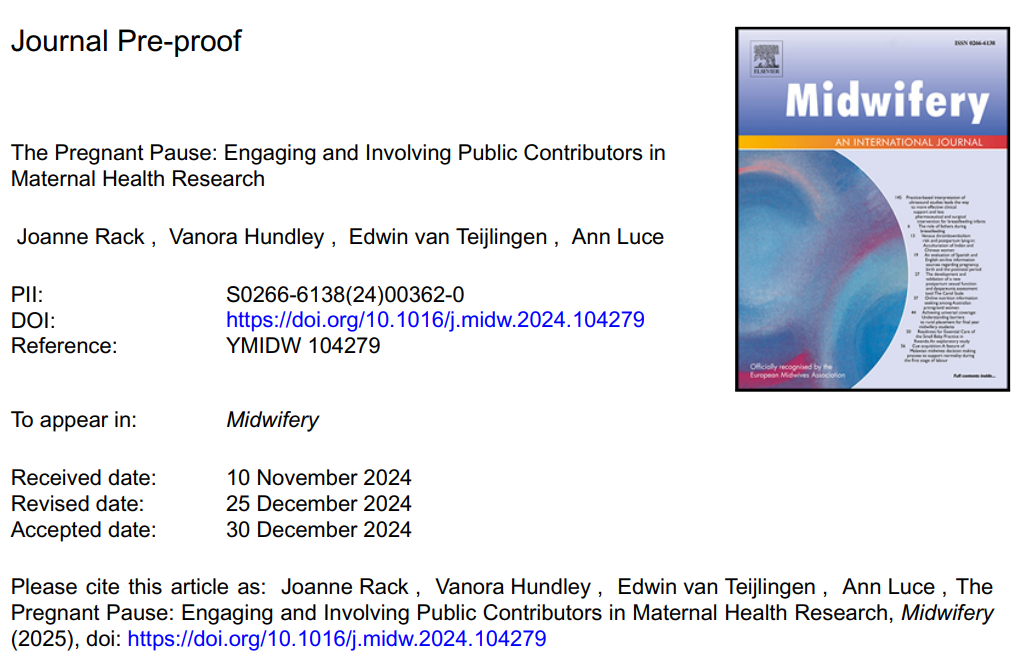 This week the international scientific journal Midwifery published Ms. Joanne Rack’s second paper from her PhD research. This latest paper ‘The Pregnant Pause: Engaging and Involving Public Contributors in Maternal Health Research‘ [1] appeared online two days ago. This paper focuses on Joanne’s PPI (Patient Public Involvement) in prepartion for her PhD research. The public contributors of PPI groups can include an extensive range of people, including patients, family members or carers, people from allied organisations, service users, and members of the general public who have an interest in research for other reasons. Participants bring their unique perspectives and experiences that can help to shape and inform the research process. This type of involvement ensures that maternal health research is grounded in the needs and preferences of those it aims to serve and grows a sense of ownership and investment among those who use the services but also those who provide them. Joanne stresses that PPI is an essential element for all maternal health endeavours.
This week the international scientific journal Midwifery published Ms. Joanne Rack’s second paper from her PhD research. This latest paper ‘The Pregnant Pause: Engaging and Involving Public Contributors in Maternal Health Research‘ [1] appeared online two days ago. This paper focuses on Joanne’s PPI (Patient Public Involvement) in prepartion for her PhD research. The public contributors of PPI groups can include an extensive range of people, including patients, family members or carers, people from allied organisations, service users, and members of the general public who have an interest in research for other reasons. Participants bring their unique perspectives and experiences that can help to shape and inform the research process. This type of involvement ensures that maternal health research is grounded in the needs and preferences of those it aims to serve and grows a sense of ownership and investment among those who use the services but also those who provide them. Joanne stresses that PPI is an essential element for all maternal health endeavours.
Joanne is doing a Clinical Doctorate in the Centre for Midwifery & Women’s Health (CMWH) specialising in personalised care for women of advanced maternal age. This PhD study is matched-funded by University Hospitals Dorset (UHD) NHS Foundation Trust and Bournemouth University.  Her PhD is supervised and supported by Profs. Vanora Hundley, Ann Luce and Edwin van Teijlingen at BU and Dr. Latha Vinayakarao in Poole Maternity Hospital. The first PhD paper with Joanne as lead author was her research protocol ‘Understanding perceptions and communication of risk in advanced maternal age: a scoping review (protocol) on women’s engagement with health care services’ published int he summer of 2024 [2].
Her PhD is supervised and supported by Profs. Vanora Hundley, Ann Luce and Edwin van Teijlingen at BU and Dr. Latha Vinayakarao in Poole Maternity Hospital. The first PhD paper with Joanne as lead author was her research protocol ‘Understanding perceptions and communication of risk in advanced maternal age: a scoping review (protocol) on women’s engagement with health care services’ published int he summer of 2024 [2].
References: